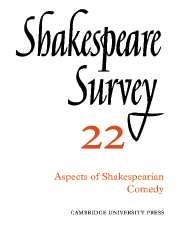Book contents
- Frontmatter
- Old and New Comedy
- An Approach to Shakespearian Comedy
- Shakespeare, Molière, and the Comedy of Ambiguity
- Comic Structure and Tonal Manipulation in Shakespeare and Some Modern Plays
- Laughing with the Audience: ‘The Two Gentlemen of Verona’ and the Popular Tradition
- Shakespearian and Jonsonian Comedy
- Two Magian Comedies: ‘The Tempest’ and ‘The Alchemist’
- ‘Thou that beget’st him that did thee beget’: Transformation in ‘Pericles’ and ‘The Winter’s Tale’
- The Words of Mercury
- Why Does it End Well? Helena, Bertram, and The Sonnets
- Some Dramatic Techniques in ‘The Winter’s Tale’
- Clemency, Will, and Just Cause in ‘Julius Caesar’
- Thomas Bull and other ‘English Instrumentalists’ in Denmark in the 1580s
- Shakespeare in the Early Sydney Theatre
- The Reason Why: The Royal Shakespeare Season 1968
- The Year's Contributions to Shakespearian Study 1 Critical Studies
- 2 Shakespeare’s Life, Times and Stage
- 3 Textual Studies
- Index
- Plate Section
Old and New Comedy
Published online by Cambridge University Press: 28 March 2007
- Frontmatter
- Old and New Comedy
- An Approach to Shakespearian Comedy
- Shakespeare, Molière, and the Comedy of Ambiguity
- Comic Structure and Tonal Manipulation in Shakespeare and Some Modern Plays
- Laughing with the Audience: ‘The Two Gentlemen of Verona’ and the Popular Tradition
- Shakespearian and Jonsonian Comedy
- Two Magian Comedies: ‘The Tempest’ and ‘The Alchemist’
- ‘Thou that beget’st him that did thee beget’: Transformation in ‘Pericles’ and ‘The Winter’s Tale’
- The Words of Mercury
- Why Does it End Well? Helena, Bertram, and The Sonnets
- Some Dramatic Techniques in ‘The Winter’s Tale’
- Clemency, Will, and Just Cause in ‘Julius Caesar’
- Thomas Bull and other ‘English Instrumentalists’ in Denmark in the 1580s
- Shakespeare in the Early Sydney Theatre
- The Reason Why: The Royal Shakespeare Season 1968
- The Year's Contributions to Shakespearian Study 1 Critical Studies
- 2 Shakespeare’s Life, Times and Stage
- 3 Textual Studies
- Index
- Plate Section
Summary
The Old and New Comedy forms in Greek literature are highly stylized and conventionalized forms, each the product of very specific cultural and historical conditions that can never recur. Each may be of course imitated in later ages: the Comedy of Errors adapts Plautus, and there is some imitation of Aristophanes in The Knight of the Burning Pestle. But more important than the possibility of imitation is the fact that the two Greek forms are species of larger dramatic genera. The kind of comedy they represent may and inevitably will recur, when a larger pattern of cultural and historical factors makes it possible.
I begin with New Comedy, as the more familiar, and as having something more like a continuous line of tradition. The distinguishing feature of New Comedy is the teleological plot: perhaps this feature had something to do with Aristotle's approval of it. As a rule the main theme of this plot is that of the alienated lover moving towards sexual fulfilment. New Comedy reaches a telos in its final scene, which is superficially marriage, and, more profoundly, a rebirth. A new society is created on the stage in the last moments of a typical New Comedy, when objections, oppositions, misunderstandings and the schemes of rivals are all cleared out of the way. This newborn society is frequently balanced by a recognition scene and a theme of the restoring of a birthright, the recognition (cognitio) being connected with the secret of somebody's birth in the very common device of the foundling plot. Much simpler and more popular is the comedy in which a hero, after many setbacks, succeeds in doing something that wins him the heroine and a new sense of identity.
- Type
- Chapter
- Information
- Shakespeare Survey , pp. 1 - 6Publisher: Cambridge University PressPrint publication year: 1970



